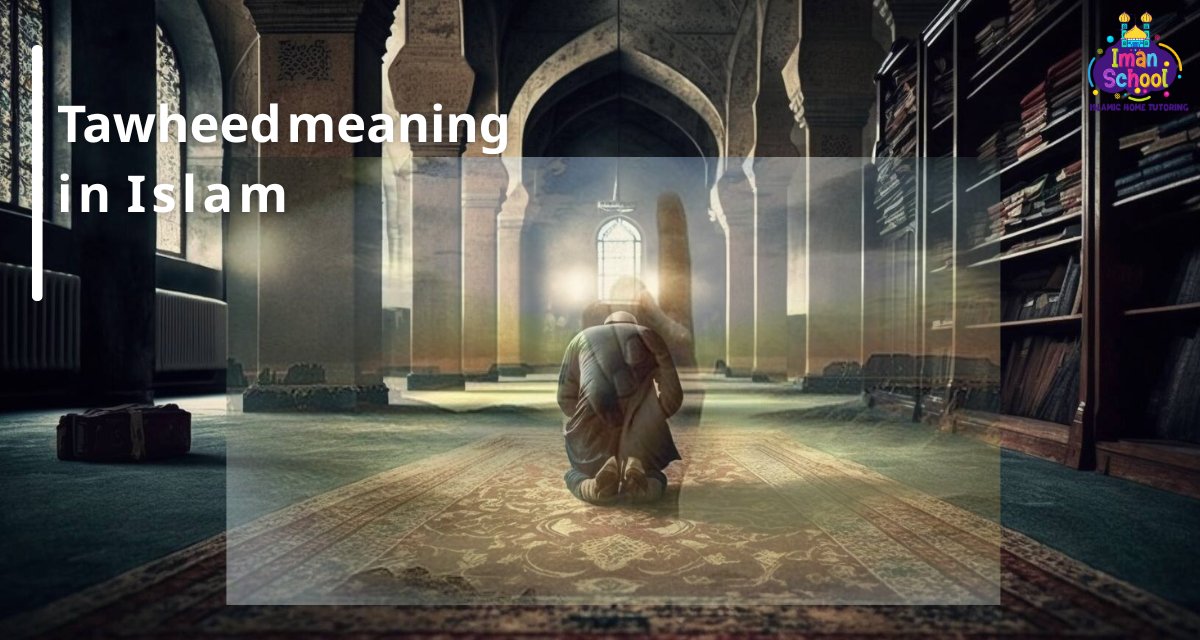https://www.iman-school.com/hadith-courseTawheed meaning in Islam encompasses the absolute Oneness, Uniqueness, and Indivisibility of Allah (God). It's the foundational principle upon which the entire Islamic faith is built, shaping every aspect of a Muslim's belief, worship, and way of life. This isn't merely a theological term; it's a profound concept that affirms Allah is One, unique in His Essence, Attributes, and Actions, with no partners, equals, or rivals.
Tawheed Meaning in Islam: The Unifying Principle of Existence
At the very heart of Islam lies a profound and revolutionary concept: Tawheed. More than just a theological term, Tawheed meaning in Islam encapsulates the absolute Oneness, Uniqueness, and Indivisibility of Allah (God). It is the foundational pillar upon which the entire Islamic faith is built, shaping every aspect of a Muslim's belief system, worship, and way of life. Without a firm understanding of Tawheed, the essence of Islam remains elusive, making it imperative for every believer to grasp its profound implications.
The Arabic root of Tawheed (وحد) signifies "to unite" or "to make one." Therefore, Tawheed meaning in Islam is the declaration and affirmation that Allah is One, unique in His Essence, Attributes, and Actions, with no partners, equals, or rivals. This concept is not merely an intellectual abstraction but a dynamic principle that permeates the Muslim's worldview, fostering a sense of submission, gratitude, and purpose. It stands in stark contrast to polytheism and any form of associating partners with God, which in Islam is known as Shirk, considered the gravest of sins.
Understanding what is Tawheed in Islam is the starting point for anyone seeking to embrace or deepen their faith. It liberates the human soul from the worship of creation and directs all devotion, hope, and fear solely towards the Creator. This singular focus cultivates true inner peace and removes the anxieties associated with relying on multiple, imperfect deities or powers. The clarity that comes with comprehending Tawheed meaning in Islam brings an unparalleled sense of liberation and spiritual alignment.

The Core of Monotheism: What is Tawhid in Islam?
To truly grasp what is Tawhid in Islam, one must understand its comprehensive nature. It is not just about intellectually acknowledging that God is one. It is about singling out Allah alone in worship, acknowledging His sole Lordship, and affirming His perfect Names and Attributes without distortion or comparison. This profound understanding of Tawheed meaning in Islam distinguishes it from other monotheistic traditions and places it as the purest form of monotheism.
The concept of Tawheed is eloquently articulated throughout the Quran. For instance, what does the Quran say about Tawhid? The shortest chapter of the Quran, Surah Al-Ikhlas (Chapter 112), perfectly summarizes this core belief: "Say, 'He is Allah, [who is] One, Allah, the Eternal Refuge. He neither begets nor is born, Nor is there to Him any equivalent.'" This powerful declaration succinctly outlines the unique and unchangeable nature of Allah, reinforcing the absolute Tawheed meaning in Islam. It negates any notion of God having offspring, parents, or being comparable to anything in creation. This fundamental truth underscores why is Tawhid important in Islam – because it defines the very nature of God and, consequently, the correct way to worship Him.
For those interested in a deeper dive, resources like "tawheed pdf" documents often provide detailed explanations, sometimes including perspectives like "tawheed salafi" which emphasize a strict adherence to this concept based on early Islamic teachings. The linguistic origin, tawheed in Arabic, directly points to "unification," highlighting its essence. For our Urdu-speaking brothers and sisters, understanding "tauheed meaning in Islam in Urdu" clarifies this same profound message in their native tongue, ensuring its reach across diverse linguistic communities.
The Three Types of Tawheed in Islam
To fully comprehend Tawheed meaning in Islam, scholars have categorized it into three interconnected types, each crucial for a complete understanding of God's Oneness. These distinctions help in clarifying different aspects of worshipping Allah and avoiding Shirk. These types of Tawheed in Islam are:
1- Tawheed ar-Rububiyyah (Oneness of Lordship)
This type of Tawheed refers to the belief that Allah alone is the Creator, Sustainer, Provider, Giver of Life and Death, and Controller of all affairs in the universe. He is the sole Lord (Rabb) of everything. Affirming Tawheed meaning in Islam under Rububiyyah means believing that there is no creator, provider, or controller of the universe besides Allah. It acknowledges His absolute power and dominion over all creation.
Even idol worshippers in pre-Islamic Arabia often acknowledged Allah as the supreme Creator, as mentioned in the Quran: "And if you asked them, 'Who created the heavens and the earth?' they would surely say, 'Allah.'" (Quran 31:25). However, their error lay in associating partners with Him in worship, which leads us to the next type of Tawheed. This inherent human recognition of a single, ultimate Creator often serves as a natural entry point to understanding the broader Tawheed meaning in Islam.
2- Tawheed al-Uluhiyyah (Oneness of Worship)
This is arguably the most crucial type of Tawheed, also known as Tawheed al-Ibadah (Oneness of Worship). It means dedicating all acts of worship, both inward and outward, solely to Allah, without associating any partners with Him. This includes prayers (Salah), supplications (Du'a), seeking help, relying, sacrificing, vowing, and any other act of devotion. If Tawheed meaning in Islam is about singling out Allah, then Uluhiyyah is its practical manifestation.
This is the central message brought by all prophets, from Noah to Muhammad (peace be upon them all): "And We certainly sent into every nation a messenger, [saying], 'Worship Allah and avoid Taghut (false deities).'" (Quran 16:36). Neglecting this form of Tawheed leads directly to Shirk, as seen when people worship idols, saints, prophets, or even their own desires alongside or instead of Allah. The very purpose of human creation, as stated in the Quran, is to worship Allah alone: "And I did not create the jinn and mankind except to worship Me." (Quran 51:56). Thus, embracing Tawheed meaning in Islam in its Uluhiyyah aspect is the essence of true submission.
3- Tawheed al-Asma was-Sifat (Oneness of Names and Attributes)
This type of Tawheed involves believing in Allah's Names and Attributes as mentioned in the Quran and authentic Sunnah of the Prophet Muhammad (peace be upon him), without distorting their meanings, denying them, likening them to creation, or giving them a form. It means affirming that Allah possesses perfect, unique, and magnificent Names and Attributes that none of His creation shares in their perfection.
For example, Allah is Al-Basir (The All-Seeing) and As-Sami' (The All-Hearing), but His seeing and hearing are not like ours. We affirm these attributes as they are, without asking "how" or comparing them to human attributes. This category of Tawheed meaning in Islam ensures that our understanding of Allah remains pure and uncontaminated by human limitations or imaginations. It prevents anthropomorphism (attributing human characteristics to God) and also avoids negating what Allah has affirmed for Himself. Understanding tawheed meaning in English often highlights this precision in theological terminology.

The Paramount Importance of Tawheed in Islam
The importance of Tawheed cannot be overstated; it is the bedrock of Islam and the core message of every prophet. Why is Tawhid important in Islam? Because it defines the ultimate purpose of existence and lays the foundation for a meaningful relationship with the Creator.
The Foundation of True Worship
Firstly, Tawheed ensures that all acts of worship are directed solely to Allah, free from any impurity of polytheism. Without Tawheed, worship loses its essence and can even become meaningless or, worse, a source of error. It is the purity of intention and direction that makes worship acceptable to Allah. This singular focus on Allah, rooted in a deep comprehension of Tawheed meaning in Islam, prevents the spiritual fragmentation that arises from divided loyalties or seeking help from multiple, finite sources.
Liberation from Superstition and Fear
Secondly, Tawheed liberates humanity from superstition, fear of creation, and dependence on anything other than Allah. When one truly believes that only Allah has ultimate power and control, fear of worldly misfortunes, evil spirits, or human oppression diminishes. This spiritual freedom brings immense peace of mind and resilience. A person who genuinely understands Tawheed meaning in Islam knows that all good and harm come from Allah, and therefore, all reliance and hope should be placed in Him alone. This perspective empowers believers to face life's challenges with courage and fortitude.
Upholding Justice and Equality
Thirdly, Tawheed promotes justice and equality among people. If all humans are servants of one God, then none is inherently superior to another based on race, wealth, or status. The only criterion for superiority is piety (taqwa). This concept, derived directly from the Tawheed meaning in Islam, fosters a sense of universal brotherhood and sisterhood, encouraging mutual respect and discouraging arrogance.
The Key to Paradise
Finally, Tawheed is the key to Paradise. The Prophet Muhammad (peace be upon him) taught that anyone who dies affirming Tawheed, without associating partners with Allah, will enter Paradise. This makes understanding and acting upon Tawheed meaning in Islam the most critical pursuit in a Muslim's life. Many "40 Hadith on Tawheed" collections emphasize this very point, illustrating its fundamental role in salvation and success in the afterlife.
Tawheed and Its Practical Implications: Living the Oneness
The understanding of Tawheed meaning in Islam is not merely a theoretical concept; it has profound practical implications that shape a Muslim's daily life, ethical conduct, and interaction with the world. Living by Tawheed means that every action, intention, and decision is ultimately geared towards pleasing Allah alone.
Cultivating Gratitude and Trust
A deep belief in Tawheed fosters profound gratitude. When one realizes that all blessings originate from Allah alone, the heart is filled with thankfulness. Similarly, it cultivates absolute trust (Tawakkul) in Allah, knowing that He is the ultimate Disposer of affairs. This allows a believer, armed with the knowledge of what is Tawheed, to face difficulties with patience and rely on Allah's wisdom.
Avoiding Shirk in All Forms
The practical application of Tawheed necessitates the avoidance of Shirk (associating partners with Allah) in all its forms, whether major (Shirk al-Akbar) or minor (Shirk al-Asghar). Major Shirk includes worshipping idols, graves, or any creation alongside Allah. Minor Shirk includes showing off in acts of worship (Riya') or swearing by other than Allah. A clear grasp of Tawheed meaning in Islam makes a Muslim acutely aware of these pitfalls and strives to purify their worship from any trace of polytheism.
This commitment to pure monotheism is the essence of "Tawheed wa Nour" (Tawheed and Light), where the light of guidance dispels the darkness of polytheism.
Guiding Moral and Ethical Conduct
Tawheed also guides moral and ethical conduct. Belief in Allah as the All-Seeing, All-Knowing, and All-Just instills a sense of accountability. This awareness, born from understanding what is Tawheed, prompts a Muslim to strive for righteousness, deal justly with others, and uphold truth, even when unobserved by humans. The fear of Allah and the hope in His reward, both direct outcomes of Tawheed, serve as powerful motivators for virtuous living.
Is Tawheed a Pillar of Islam? Addressing a Common Question
A common question that arises is: is Tawheed a pillar of Islam? While Tawheed is the fundamental principle and the core of the Islamic faith, it is not listed as one of the Five Pillars of Islam in the traditional sense. The Five Pillars are: the Shahada (declaration of faith), Salah (prayer), Zakat (charity), Sawm (fasting), and Hajj (pilgrimage).
However, the Shahada – "La ilaha illa Allah, Muhammadur Rasul Allah" (There is no god but Allah, and Muhammad is His Messenger) – is the direct declaration of Tawheed. Thus, Tawheed is the very essence of the first and most important pillar. It is the conceptual foundation upon which all other pillars stand. Without believing in Tawheed, the other pillars have no spiritual validity. So, while not a "pillar" itself in the list of five, it is the overarching doctrine that defines the belief system, making it far more fundamental than just one component; it is the entire framework.
This clarifies why what is Tawheed transcends a mere definition and embodies the spirit of Islam. For those curious about the implications of names, "tawheed name meaning in Islam" typically refers to the concept itself rather than a personal name, reinforcing its unique theological significance
Learn the Core of Islamic Belief
Looking for Trusted Islamic Education?
At Iman School, we help students grasp the essential meaning of Tawheed in Islam with clarity and purpose. Enroll now and let your heart connect with the foundation of Islamic faith.
Knowing Allah’s Oneness isn't just knowledge—it's a way of life. Learn how to apply Tawheed in daily living with personalized lessons and support from Iman School’s qualified teachers.




